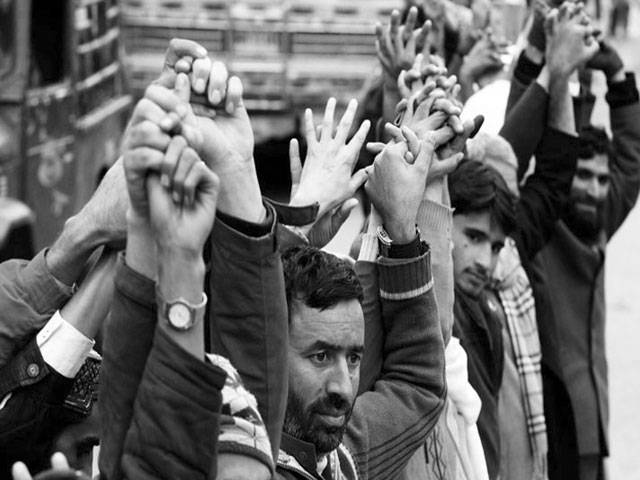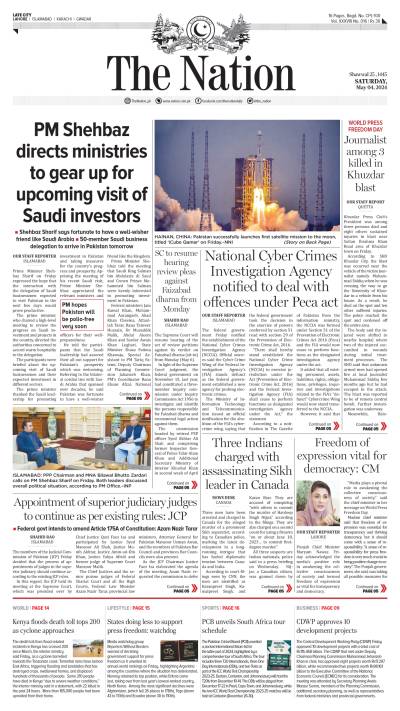The British sold Kashmir to the Raja of Jammu, Gulab Singh, for 7.5 million rupees (75 lakhs). The treaty of sale was concluded on March 16, 1846, in the Treaty of Amritsar and signed by Gulab Singh, Hardinge, Currie and Lawrence. Gulab Singh thus became the founder and first Maharaja of the princely state of Jammu and Kashmir.
Ranbir Singh’s grandson Hari Singh, who ascended the throne of Kashmir in 1925, was the reigning monarch in 1947 at the conclusion of British rule in the subcontinent and the subsequent partition of the British Indian Empire into the newly independent Union of India and the Dominion of Pakistan. An internal revolt began in the Poonch region against oppressive taxation by the Maharaja. In August, Maharaja’s forces fired upon demonstrators in favour of Kashmir joining Pakistan, burned whole villages and massacred innocent people. The Poonch rebels declared an independent government of “Azad” Kashmir on October 24. Rulers of Princely States were encouraged to accede their States to either Dominion - India or Pakistan, taking into account factors such as geographical contiguity and the wishes of their people. In 1947, Kashmir’s population was “77% Muslim and 20% Hindu.“
The United Nations was then invited to mediate the quarrel. The UN mission insisted that the opinion of Kashmir’s must be ascertained. The then Indian Prime Minister is reported to have himself urged UN to poll Kashmir and on the basis of results Kashmir’s accession would be decided. Unfortunately, the matter is still to be resolved in the light of UN resolutions. Kashmir is the main bone of contention between India and Pakistan. When it comes to disintegrate Muslim countries, World’s super powers come into action to show their power and ensure rights of minorities (provided minority is not a Muslim). But when it comes for freedom of Kashmir these super powers forget their role and use evasive techniques.
The battle of freedom was fought by Kashmir’s in 1989 but due to lack of cohesion and logistic support could not achieve desired results. Pakistan has always supported Kashmir cause morally and ethically. Despite having drowned in the deep waves of terrorism and energy crises, we still eulogize the efforts of Kashmir’s and pray for their success in freedom mission. Kashmir Solidarity Day has been observed on February 5 each year since 1990 in Pakistan as a day of protest against Indian control of part of Kashmir.
IFTIKHAR MIRZA,
Islamabad, February 4.
Saturday, May 04, 2024
Solidarity on Kashmir Day

Caption: Solidarity on Kashmir Day
Dr Ahmar Sohail Basra assumes charge as Radio Pakistan Lahore station director
4:55 PM | May 04, 2024
Hearing against Ali Amin Gandapur adjourned until May 17
4:53 PM | May 04, 2024
May 9 perpetrators now giving statements about talks with military: Khawaja Asif
4:52 PM | May 04, 2024
Will provide free medicines to 200,000 patients at their doorstep: CM Maryam
4:51 PM | May 04, 2024
Saudi Arabia introduces new measures to reduce people performing illegal Hajj
4:20 PM | May 04, 2024
Tourist Tragedy
May 04, 2024
Ending Polio
May 04, 2024
Will Justice Prevail?
May 04, 2024
Fair Play
May 03, 2024
Parliamentary Stalemate
May 03, 2024
Current state of affairs
May 04, 2024
Cryptocurrency revolution
May 04, 2024
The accessibility revolution
May 03, 2024
Maternal well-being
May 03, 2024
Tackling poverty
May 02, 2024
ePaper - Nawaiwaqt
Advertisement
Nawaiwaqt Group | Copyright © 2024





